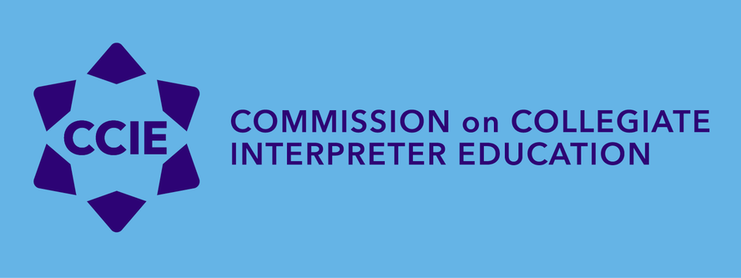So, you’re fluent in ASL, and you want to learn to become an interpreter. How do you decide where to apply? There are many interpreter education programs (IEPs) at colleges and universities across the United States and in Canada.
One consideration may be whether the IEP is an accredited program. CCIE (Commission on Collegiate Interpreter Education) is an independent agency. It is the only recognized body that accredits IEPs in the US and Canada. It was established in 2006 after many years of collaboration among six stakeholder organizations: The National Alliance of Black Interpreters, Inc., National Registry of Interpreters for the Deaf, National Association of the Deaf, Conference of Interpreter Trainers, Canadian Association of Sign Language Interpreters, and the American Sign Language Teachers Association.
CCIE has 10 areas in which a program must meet standards of quality in order to be accredited. To maintain accreditation, reviews occur every two years, and after ten years, a complete program review is conducted.
Standard 1.0 Program Quality: Mission, Goals, Philosophy and Governance
Standard 2.0 Institutional Commitment and Resources
Standard 3.0 Students – Access to Academic Advice, Policies and Services Information
Standard 4.0 Faculty – Qualifications, Deaf/Deafblind, Diversity, Performance, Ratio to Students
Standard 5.0 Program Quality: Curriculum and Teaching-Learning Practices
Standard 6.0 Curriculum: Knowledge Competencies
Standard 7.0 Curriculum: Skills Competencies
Standard 8.0 Curriculum: Interpreting Field Experience
Standard 9.0 Outcomes, Assessments & Evaluation
Standard 10.0 Improvement, Planning, and Sustainability
For more information about these standards and a list of accredited programs, go to http://www.ccie-accreditation.org.
The CCIE accreditation process ensures that an institution’s interpreter education program meets defined quality standards. It does not compare or rank accredited programs. At the present time, there are 16 Bachelor’s degree programs and 4 Associate’s degree programs in the United States with CCIE accreditation.
It is important to note that curricula vary from program to program, so it is worthwhile to do your research to ensure that the program encompasses all the necessary components needed to become a successful interpreter. Here are some questions that you can ask when considering enrollment in an IEP:
- Is this program accredited by the CCIE? If not, why not?
- Do you have a practicum or internship component in your IEP? If so, how many hours are required and what does it entail?
- Are your faculty members certified sign language interpreters?
- What kind of facilities do you have available to students? A visual language lab? Classrooms and class sizes? Resources?
- Does this program focus on one specialty of sign language interpreting? Educational interpreting? Community interpreting?
- Does this program teach Deaf culture? ASL skills are only part of the picture in becoming a successful interpreter.
- Are there opportunities for becoming involved in the local Deaf community?
- Do you teach classes on ethical decision making?
Doing as much research as possible before you enroll goes a long way in preparing the path to your ultimate goal of becoming a certified interpreter.

